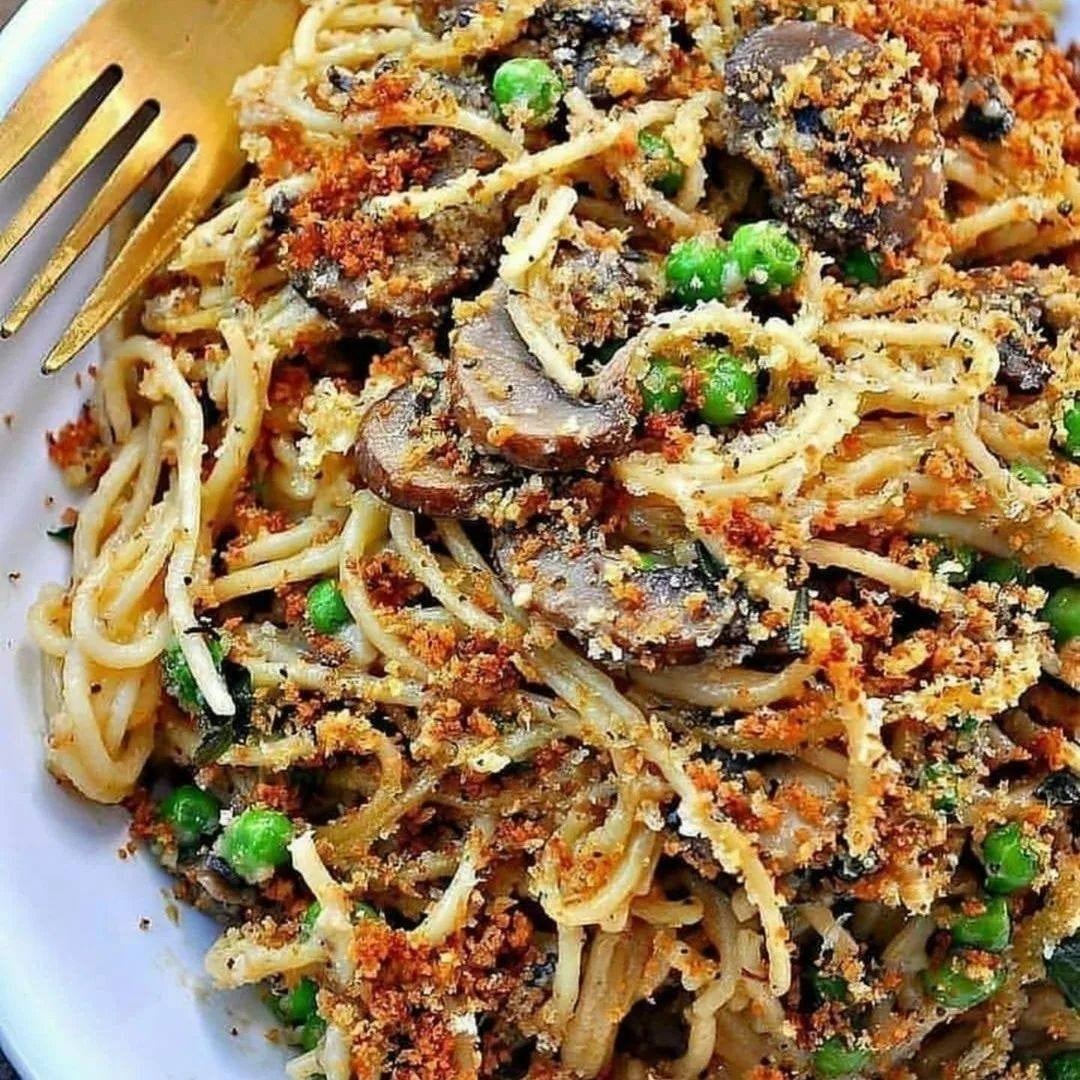Vegan one pot mushroom tetrazzini
Contents:
* 1 tablespoon. olive oil
* 16 oz. Sliced mushrooms, I used baby bella
* 2 cloves of garlic, chopped
* 1/4 C. Vegan butter, I used Earth Balance
* 1/4 C. All-purpose flour
* 3 C. Vegetable broth
* 1 C. Almond milk or other non-dairy milk of choice
* 10 oz. Spaghetti
* 1/2 C. Frozen peas
* 1/2 C. Panko breadcrumbs
* 2 tablespoons. nutritional yeast
* Pepper and salt to taste
* Parsley to garnish
Instructions:
Preheat the oven to 350°F or 450°F, depending on the recipe.
Cook spaghetti or other pasta of your choice according to package directions. Drain and set aside.
In a large ovenproof pot or skillet, heat a little oil over medium-high heat and saute the sliced mushrooms and garlic until browned and softened. Season with salt and pepper and remove from the pot.
In the same pot, melt some vegan butter over low heat and whisk in all-purpose flour to make a roux. Cook for a few minutes, stirring constantly, until smooth and bubbly.
Gradually add some vegetable broth and dairy-free milk of your choice. Bring the sauce to a boil, then reduce the heat and simmer until it thickens slightly. You can also add some vegan Greek yogurt, nutritional yeast, lemon juice or other spices for extra flavor and creaminess.
Stir in some frozen peas or other vegetables if desired. Add the cooked pasta and mushrooms and stir to combine everything well.
Sprinkle some panko breadcrumbs, vegan cheese, or nutritional yeast over the pasta mixture. Bake for 10 to 15 minutes or until golden and bubbly.
Garnish with some chopped parsley or other herbs if desired. Enjoy your vegan one-pot mushroom tetrazzini!
Gut Health:
Plant-based diets are often associated with improved gut health due to the high fiber content from fruits, vegetables, and whole grains. A healthy gut microbiome is linked to better digestion and overall well-being.
Anti-Inflammatory Properties:
Many plant-based foods have anti-inflammatory properties, which can help in reducing inflammation in the body. Chronic inflammation is associated with various health issues, and a vegan diet may contribute to its prevention.
Sports Performance:
Contrary to the misconception that vegan diets lack protein, many successful athletes follow plant-based diets to enhance their performance. Plant-based proteins can support muscle building and recovery.
Reduced Risk of Foodborne Illnesses:
Plant-based diets eliminate the risk of foodborne illnesses associated with the consumption of undercooked or contaminated animal products.
Economic Impact:
A vegan diet can be more economical as plant-based protein sources tend to be cost-effective compared to some animal products. It may be a budget-friendly option for individuals or families.
Mindful Eating:
Adopting a vegan lifestyle often promotes mindful eating. Being more conscious of food choices and sources can lead to a healthier relationship with food and a greater appreciation for the environmental impact of dietary decisions.
Preservation of Biodiversity:
The expansion of animal agriculture often leads to habitat destruction and loss of biodiversity. Choosing a vegan diet supports the preservation of ecosystems and the protection of various species.
Culinary Diversity:
Veganism introduces individuals to a diverse range of cuisines and ingredients from around the world. Exploring plant-based cooking can be a culinary adventure, embracing flavors and techniques from different cultures.
Reduced Antibiotic Resistance:
The use of antibiotics in animal farming contributes to the rise of antibiotic-resistant bacteria. Opting for a vegan diet can be a way to reduce the demand for such practices and promote responsible antibiotic use.
Cruelty-Free Beauty and Personal Care:
Veganism extends to beauty and personal care products. Choosing cruelty-free, vegan alternatives ensures that your lifestyle aligns with ethical choices beyond just dietary preferences.


